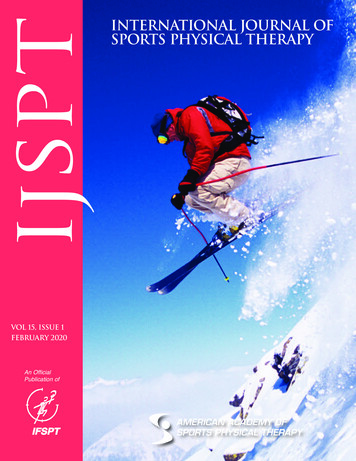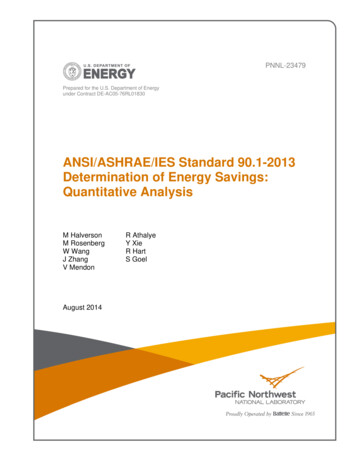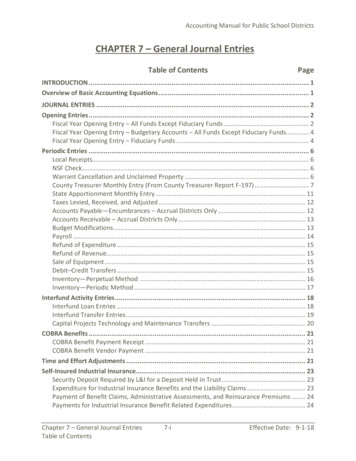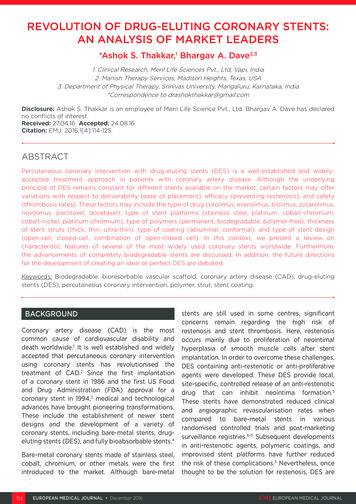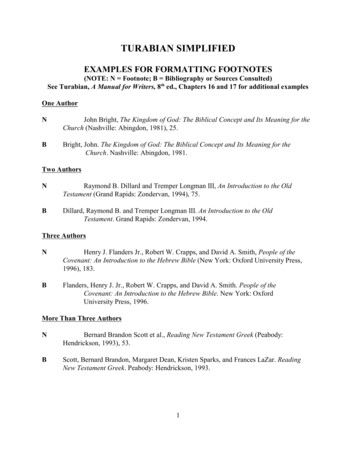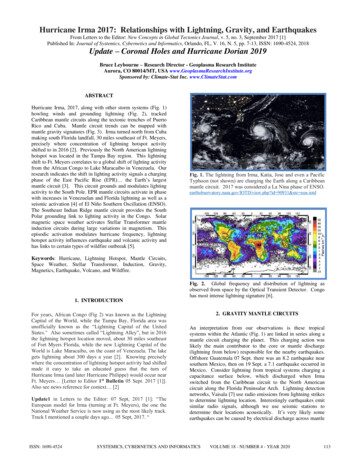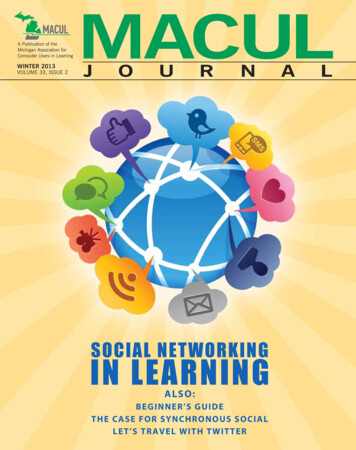
Transcription
A Publication of theMichigan Association forComputer Users in LearningWinter 2013VOLUME 33, ISSUE 2MACULJOURNSOCIAL NETworkingin learningAlso:Beginner’s G u id eThe C ase for S ynchronou s S oc ia lLet’s Trave l with T witte rAL
Preparing Students for a Competitive FutureMichigan Virtual School partners with schools tooffer students equal access to diverse courses. MVS helps provide a way for students to build technologyskills and tools that will help them succeed.MVS COURSE OFFERINGSARE VARIED AND FLEXIBLE:9 MVS Plus, MVS Basicand MVS Blendedformats meet MMCstandards whereapplicableYou Can LearnVirtually Anything 9 19 AP courses9 78 NCAA approvedcourses9 Courses for high schooland middle schoolstudents9 MVS courses are SeatTime Waiver eligibleJoin us on Facebook and chiganvirtualVisit www.mivhs.org for more information.
The MACUL Journal is published four times per year(Fall, Winter, Spring, Summer) by MACUL, the MichiganAssociation for Computer Usersin Learning, Inc.MACUL OFFICE3410 Belle Chase Way, Suite 100Lansing, MI 48911Telephone 517.882.1403Fax 517.882.2362E-mail: macul@macul.orgwww.macul.orgExecutive DirectorRic Wiltserwiltse@macul.orgExecutive AssistantIeva Kuleikule@macul.orgBusiness ManagerBarbara Surtmanbsurtman@macul.orgMember Services AssociateKrystal Ohlerkohler@macul.orgProfessional Development CoordinatorSheila Dunhamsdunham@macul.orgMACULJOURNALA publication of the Michigan Association for Computer Users in LearningWinter 2013 Volume 33, Issue 2CONTENTSCalendar. 4MACUL Officers and Board of Directors. 5Special Interest Group Directors and LISTSERV groups. 5Announcing. 6MACUL Announces Free Special Interest Group Membership. 6MACUL Journal EditorJudy Paxtonjpaxton@macul.orgThe Power of the Crowd. 7WebmasterPaul Yelenskypyelensky@mac.comBeginners Guide to Social Networking for the Classroom. 8Become a MACUL member for free at www.macul.org/membership, or sign up to become a Friend of MACULfor 20/year and have the MACUL Journal print versionmailed to you. The MACUL Journal digital version isavailable at www.macul.org.The MACUL Journal welcomes and encourages letters,articles, suggestions, and contributions from readers.Publishing guidelines are posted at:www.macul.org MACUL Journal.All editorial items and advertising inquiries should be sent to:Judy Paxton, Editor231.342.4801E-mail: jpaxton@macul.orgComposition and design by:Jonathan GuinnRogers Printing, Inc.3350 Main St.Ravenna, MI 49451Telephone 800.622.5591The Case for Synchronous Social. 11Kid Safe Social Networking. 12Quick Keys and Tips: Effectively Moving the Message. 13Let’s Travel with Twitter. 14Work Smarter, not Harder. 17Social Networking: Personal, Educational, and All Mixed Up. 18The Facebook Faceoff. 21Promoting Participation and Collaboration with Piazza. 24REMC in Focus: The New and Really Cool 21things4students. 25Information is available upon request.Portions of the MACUL Journal may be reprinted withpermission as long as the source is clearly acknowledged.Achieving Library 2.0. 26Opinions expressed in the Journal are those of the authorsand do not necessarily represent MACUL.MACUL Grants Awarded. 28Publication of items in the MACUL Journal does not implyendorsement by MACUL.
2012-2013November 2012November 7 MACUL Journal articles due for 2013 Spring issue:Blending Technology & Curriculum for Today’s LearnerNovember 15, 16 Michigan Digital Learning Conference, Macomb ISDIgniting Learning ThroughMeaningful Collaboration AndInnovationFounded 1975An organizational member ofThe International Societyfor Technology in EducationMACUL is a 501 (c) (3) non-profitorganization that exists to:p rovide a state association foreducators involved with, or seekingknowledge of, computer-relatedtechnology in learning provide for the sharing and exchangingof ideas, techniques, materials, andprocedures for the use of computerrelated technology throughconferences, publicationsand support services promote and encourage effective,ethical and equitable use of computerrelated technologyin learning encourage and support researchrelating to the use of computer-relatedtechnology in learning. November 20 MACUL Board Meeting, Plante & Moran, East LansingNovember 28 AT&T/MACUL Student Technology Showcase,Michigan Capitol Building, LansingDecember 2012December 18 MACUL Board Meeting, conference callJanuary 2013January 10 miMoodle Conference, Clinton County RESA, St. JohnsJanuary 15 MACUL Board Meeting, Lansing Community College, West CampusFebruary 2013February 5 MACUL Journal articles due for 2013 Summer Issue:Internet Safety, BullyingFebruary 19 MACUL Board Meeting, Lansing Community College, West CampusMarch 2013March 20 - 22 2013 MACUL Conference, Blending Technology & Curriculumfor Today’s Learner, DetroitApril 2013April 16 MACUL Board Meeting, Lansing Community College, West CampusApril 26 MACUL Upper Peninsula Conference, HoughtonMay 2013May 17 MACUL Journal articles due for 2013 Fall Issue: eCurriculumJune 2013June 23-26 ISTE 2013 Conference, San Antonio, TXUse the online digital MACUL Journalwww.macul.org/maculjournal/Download the complete PDF, or, usethe online digital journal. These formatsgive the reader direct access to liveresource links in the articles.E-mail address:If using the online digital version,look for embedded icons to viewthe additional videos and PDFs thatmay be connected with articles .orgShare the links with your colleagues!4Winter 2013 MACUL journal
MACUL OFFICERSSPECIAL INTEREST GROUP DIRECTORSSteve Schiller,PresidentMuskegon Heights Public Schoolssteve.schiller@macul.orgPete Mantei,TreasurerSault Ste. Marie Area Schoolspmantei@eup.k12.mi.usBill WiersmaSIG LiaisonMACULbwiersma@macul.orgPam Shoemaker,President ElectWalled Lake Consolidated Schoolspamelashoemaker@wlcsd.orgTammy Maginity,SecretaryPennfield Schoolsmaginitt@pennfield.netPamela MooreSIGCSEastern Michigan Universitysheltiepam@earthlink.netMike Oswalt,Past PresidentCalhoun ISDoswaltm@calhounisd.orgJohn PhillipsSIGEEBattle Creek Public SchoolsJPSousa@gmail.comMACUL BOARD OF DIRECTORSMelinda WaffleSIGMMCalhoun ISDwaffle@calhounisd.orgKevin ClarkBerrien RESAkevin.clark@berrienresa.orgJulie Myrmeljdmyrmel@me.comLaura CummingsOakland SchoolsLaura.Cummings@oakland.k12.mi.usTodd NeibauerTraverse City AreaPublic Schoolsneibauerto@tcaps.netTim DavisCharlevoix-Emmet ISDdavist@charemisd.orgSandra PlairMichigan State Universitymiztech@gmail.comGina LovelessSIGPLCalhoun ISDgina.loveless@macul.orgTerri GustafsonMichigan State Universityterrigus@msu.eduDavid PrindleByron Center Public Schoolsdavid.prindle@macul.orgRose McKenzieSIGSPEDJackson ISDrose.mckenzie@jcisd.orgRon HoutmanKent ISDronhoutman@kentisd.orgMatinga RagatzGrand Ledge Public Schoolsmatingaragatz@gmail.comTim Kampstkamps@gmail.comMary SaffronFraser Public SchoolsMary.saffron@fraser.k12.orgRon MadisonFlint Community Schoolsrmadison1@flintschools.orgBarbara FardellMDE LiaisonFardellB@michigan.govCarolyn McCarthyShiawassee RESDcjmccarthy56@gmail.comMACUL journalSue SchwartzREMCAM Liaisonsueschwartz@remc.org Winter 2013Carol IsaksonSIGOLPlymouth-Canton Community Schoolscarol@isakson.orgJeff TrudellSIGTCWyandotte Public Schoolsjeff.trudell@wy.k12.mi.usDaryl TilleySIGTECHdtilley@inghamisd.orgBen RimesMattawan SchoolsSIGWEBben@techsavvyed.netGo to www.macul.org Special Interest Groupsfor complete listing of SIG Officers and SIGinformation.5
From the President’s DeskAnnouncing.By Ric WiltseMACUL AnnouncesFree Special InterestGroup MembershipBy Steve SchillerSeveral years ago MACUL embarkedon a new journey of Strategic Planning.Looking back recently, I was amazed atall of the projects that have become areality due to that planning. There aremany members of the MACUL leadership, both past and present, who workedextremely hard on this, and we owe allof them a great debt of gratitude.At their annual Leadership Retreat, theMACUL Board approved free membership forall Special Interest Groups (SIGs). The offer isavailable to all MACUL members. Memberscan join between one and all ten SIGs at nocharge.The ten Special Interest Groups are:Strengthening our partnerships withother State and National organizationshad long been a goal, and our new partnership with the Regional EducationMedia Center Association of Michigan(REMCAM) will solidify one of ourprimary goals, which is to providequality professional development toour members. This new partnership isalready paying off as this fall MACULand REMCAM jointly announced thehiring of Sheila L. Dunham as the newProfessional Development Coordinatorfor both organizations. Sheila cameto the MACUL and REMCAM’s jointposition with experience in developingeducator training programs for InghamIntermediate School District andCentral Michigan University. As can beseen in the comments below, her hiringpromises to bring both organizations toa new level.“We are thrilled to partner with theREMC Association of Michigan to bringSheila to our staff in this new capacity.Sheila’s extensive background in designing and implementing professionaldevelopment experiences will enable herto expand our catalog of workshops andconferences to better train Michiganeducators for technology readiness,”said MACUL Executive Director RicWiltse.“We are very fortunate to have Sheilaas our new shared ProfessionalDevelopment Coordinator. Sheila’saccomplishments are exceptional. Shehas what it takes to help us achieveour priority of increasing statewideeducational technology professionaldevelopment statewide to improvestudent achievement. She is a greataddition to our team,” said REMCAMExecutive Director Sue Schwartz.All of this promises improvedprofessional development and servicefor our members. Welcome Sheila!Steve Schiller has been an educator since1976 and is currently working for MuskegonHeights Public Schools. He has been a MACULmember since the mid 1980’s and is the 20122013 MACUL President.6From theExecutiveDirector Winter 2013SIGCS - Computer ScienceSIGEE - Elementary EducationSIGMS - Media SpecialistsSIGMM - MultimediaSIGOL - Online LearningSIGPL - Professional LearningSIGSPED - Special EducationSIGTC- Technology CoordinatorsSIGTECH - TechniciansSIGWEB - WebmastersThe SIGs are a great way to connect to educators with similar interests. In addition toworkshops and membership meetings offeredduring the annual MACUL conference, SIGsalso hold smaller events during the year. SIGmembers also have the option of subscribingto SIG Google Groups to keep current withupcoming activities and to form personal learning communities.Sign up for the SIGs at www.macul.org.New MACUL LogoYou may have noticed that the MACUL logohas been updated. After using the former logosince the 1970’s, MACUL has been in search ofa more modern logo for over a year.The old logo included an icon of a computer,with some saying it was strategically positionedover Oakland County, home of early organization founders.The new logo reinforces the mission ofMACUL; education technology is morethan just computers, it is our opportunity toignite learning throughmeaningful collaboration!Over the nextseveral months you’ll be seeing the transition tothe new logo. We hope you like it!MACUL journal
The Powerof the CrowdBy PamShoemakerMore than 1,000 educators signed a petition to urge the USCongress to support technology professional development whileat the ISTE (International Society for Technology in Education)Conference in San Diego that took place this past June.The petition was delivered to Congress by Hillary Goldman,ISTE Director of Government Affairs, and Don Knezek,ISTE CEO. It was written in response to Congress havingeliminated funding for the EETT (Enhancing EducationThrough Technology) program. ISTE warns that without federalsupport, many professional development programs focusingon technology will be shut down, making it difficult to preparechildren for 21st century careers. ISTE calls on policymakers toprovide the investment and leadership necessary to ensure ourschools and educators have support needed to provide a worldclass education for all students.The EETT program was a US Department of Education initiativethat was included with Title IID. Its goal was to provide schooldistricts, particularly those serving lower income students,with the resources necessary to improve teaching and learningthrough the integration of technology into the classroom. Fundswere allocated to states, and states allocated the funds to localdistricts based on Title 1 rules and/or competitive grants.In recent years, Michigan used EETT funding to provideprograms and resources that have had far-reaching impact onMichigan’s educators and students: MI Champions: a statewide model for professional developmentthat provides the skill set necessary for building based“Technology Integration Champions” at the local level. Over1850 teachers have participated in collaborative teams andover 100,000 students have benefitted from the MI Championsprogram.STEM MI Champions: a statewide model for professionaldevelopment focusing on science, technology, engineeringand mathematics. Project teams work across disciplines to buildproject-based learning units. These technology-rich, UniversallyMACUL journal Designed units challenge students to solve real issues that affectour society. The result: increased engagement and achievementfor all students. MI Learning on iTunes U: a gateway to educational audio,video, and PDF files shared by organizations and educatorsthroughout Michigan offered free of charge. These curriculum,leadership, and professional development resources can beaccessed using computer and mobile devices, offering greatlearning opportunities for students, educators and community anytime and anywhere! Statewide Curriculum and Tech Director Meeting: An annualgathering of curriculum and technology leaders to stay informedabout relevant updates and network with the purpose ofmerging curriculum and technology initiatives. Student Technology Showcase at the MI Capitol: An eventheld at the Michigan State Capitol Building to allow lawmakers,business leaders and other citizens to see first-hand howtechnology is used in classrooms across Michigan. K-12 studentteams representing legislative districts from around the statedemonstrate best practices of how technology can enhanceteaching and learning for the success of Michigan students.The impact of the loss of EETT funding will no doubt be felt inMichigan schools. These outstanding programs may need to beeliminated or reduced. Something that we can all do to makeour voices heard regarding the need to support educationaltechnology by policy makers is to use the Ed Tech ActionNetwork at http://edtechactionnetwork.org. Click on “Act Nowto Restore EETT Funding in FY 2013.”MACUL Advocacy Blog: http://maculadvocacy.wordpress.com/Pam Shoemaker, ED.S. is the MACUL President Electand Advocacy Committee Chairperson. She serves as anInstructional Coach for the Walled Lake ConsolidatedSchool District.Winter 20137
Beginner’s Guide to SocialNetworking for the ClassroomBack in the early days of online social networks, many popular virtual communities for students were either decentralized,or existed in forms that made them less than approachable tothe average educator. The ICQ and AIM networks consisted ofnot much more than disjointed chat sessions, with conversations sometimes lasting just a few minutes to possibly hours,depending on how engrossed the participants were in the chats.MySpace, the progenitor of most current day virtual social networks, often resembled the best and worst aspects of students’social interactions as parents and educators started to explorewhat online social networking was all about.Although social networking technologies have advanced quicklyin just a few shorts years, and the number of electronic devices8 By BenRimesaccessible to teachers has increased dramatically (when includingthose that the students themselves can bring to school), there arestill many educators who would like to introduce some aspect ofsocial networking into their classroom. Whether it’s extendingface-to-face discussions onto the internet, or looking for ways tocreate virtual study sessions, there are many ways for teachers toreach and connect with students and parents in the social networking space.Establishing the EnvironmentAs someone who specializes in instructional technology, surrounding myself with technological tools and toys every day,many educators are often surprised when I begin conversa-Winter 2013 MACUL journal
tions with them about social networking by asking what they’redoing offline with their students. Too often teachers will rushto establish a website, Facebook Page, or Google Group afterbecoming excited about seeing the possibilities play out in otherclassrooms, but haven’t taken the time to think about how theirface-to-face environment might best be amplified online. Forexample, a history teacher at my high school was looking fora way for every student in his classroom to participate in classdiscussions, but was limited by the amount of time he had withthe students each day. We talked about the depth that he wishedthe conversations could have, and how he wanted students toplay off of ideas and questions posed in class. While the ideaof a Facebook Group or a wiki had crossed his mind, we foundthat a Google Group throughout school’s Google Apps forEducation accounts worked wonderfully. Students turned whatwould have been a very limitedconversation about the anniversary of the 9/11 attacks into anasynchronous conversation overthe course of a week with wellover 200 posts and replies.Because the teacher I was working with had a strong sense ofhow to conduct conversations inthe classroom that would allowstudents to mix personal narratives and reflections with theirreadings and schoolwork, it waseasy to transition that conversation to a social tool that was wellsuited for it. Sadly, not all firstventures with social networking and online discussion go sosmoothly. Often teachers may be initially excited about the socialand collaborative nature of a wiki, only to turn it into a one-waypublishing platform for them to give information to students. Orteachers that start using Twitter to share images and “happenings” in the classroom with parents in a near real-time fashion,quickly tire of being part-time micro-bloggers, and give up sharing and publishing new content. Each of these cases illustratethe playfulness and exploration that many educators possess, butoften the lack of time or resources to think about what tool mightbest suit them, or how their classroom environment might bestsupport the use of the tool.Above all else, is the importance of recognizing that enteringthe world of social media and networking m
The MACUL Journal is published four times per year (Fall, Winter, Spring, Summer) by MACUL, the Michigan Association for Computer Users in Learning, Inc. MACUL OFFICE 3410 Belle Chase Way, Suite 100



